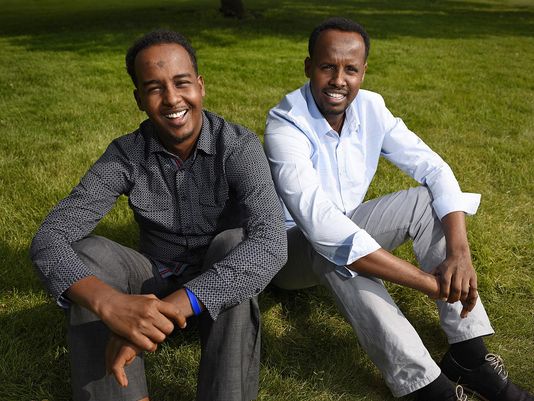Kenyan refugee camp friendship rekindled in St. Cloud

 The recent stream of Somali immigrants and refugees who are making their mark in St. Cloud is partly the reason Hussein Mohamud and Feisal Ali decided to live in the city.
The recent stream of Somali immigrants and refugees who are making their mark in St. Cloud is partly the reason Hussein Mohamud and Feisal Ali decided to live in the city.
The childhood friends who grew up in the dusty and arid Dadaab refugee camp in Kenya also picked St. Cloud to be closer to their families here — and to Minneapolis, which has a vibrant Somali-American presence and serves as the capital city for Somalis in North America.
“It’s a small place,” Ali said of St. Cloud. “Anywhere you want to go in the city is just about 10 minutes away. People really like that.”
Mohamud added: “St. Cloud is really a nice city. It’s promising for young Somalis … many kids are graduating from colleges and high schools.”
Before their arrival in St. Cloud, Mohamud and Ali spent more than two decades in Dadaab, the largest refugee camp in the world.
Both escaped the civil war in Somalia — which erupted in 1991 — and sought refuge in the camp, which has more than 400,000 people. They initially thought the war would end sooner and planned to return home in a matter of months.
That wasn’t the case, however.
The civil war in Somalia stretched into decades. For Ali and Mohamud, this meant living more than 20 years in dire conditions in the camp.
Like many refugees, Ali and Mohamud lacked access to adequate education and employment, and were confined to life without sanitation, food and health facilities.
Mohamud added: “We were not allowed to leave the camp and find opportunities elsewhere. It felt like an open prison.”
Opening doors for refugees
Because of the seething violence in Somalia and the human rights abuse they faced in Kenya, Ali and Mohamud decided to pursue a better life in the United States under the U.S. Refugee Resettlement Program, which has admitted over 3 millions refugees from various countries in the world since 1975.
“You can overcome anything you want in this country, regardless of your religion or family background,” Mohamud said. “That’s why I always wanted to come to America.”
During the past 20 years, St. Cloud has become home to thousands of Somalis, many of whom flocked from refugee camps in Kenya and Ethiopia.
Natalie Ringsmuth, a longtime resident of Waite Park, said the immigrant and refugee communities bring rich culture and unique perspectives to the area.
“I really love it for my kids to be able to have a global environment,” said Ringsmuth, speaking of new communities. “It’s very important to get to know individuals in the community. It’s really inspiring when you hear the stories of what people had to go through to get here.”
Coming to America
In 2010, after a lengthy and arduous process through the United Nations, Ali arrived in North Carolina. He immediately found a job at the airport.
Then he quit it right away.
“The state’s public transportation wasn’t the best,” he said. “I used to take a shuttle and three buses to get to my place. Sometimes, I remember leaving work at 12 p.m. and coming home at night. It was difficult. I couldn’t continue with that.”
His friends in Texas recruited him for a job at ATC Logistics and Electronics in Arlington. After about a year and a half, the business slowed down, and Ali’s 40-hour-a-week job was reduced to less than 20 hours a week.
“Again, I left that job,” he said. “I couldn’t just work for 20 hours per week. That wouldn’t give me the American dream I had been searching (for).”
In 2012, Ali began a new endeavor: He became a truck driver, delivering construction materials and other items to nearly all the states in America and to Canada.
Meanwhile, Mohamud left Dadaab for a new life Nashville, Tennessee, in 2012.
Just 30 days after his arrival, Mohamud secured a job at Dell Inc. in Nashville. When he was not working, he volunteered with the Catholic Charities of Tennessee and the New American Times.
Mohamud said he wasn’t surprised that he and Ali accomplished a lot in the short period they’ve lived in the U.S.
“I think we prepared for life in America when we were in Dadaab,” Mohamed said. “We worked hard to learn English. We always participated and led in youth development programs.”
Reuniting in St. Cloud
Although Nashville presented Mohamud many employment opportunities, he decided to move to St. Cloud in April. Mohamud reunited with Ali, who had moved to St. Cloud in 2013.
Mohamud, 25, now works as a freelance interpreter at the Bridge-World Language Center and is enrolled at St. Cloud Technical & Community College.
Ali, 30, is a driver manager at MGL Express LLC, the trucking company he co-founded in February. In the fall, he plans to take classes at St. Cloud State University.
“People missed him when he left Dadaab,” Mohamud said of Ali. “He was involved in many activities there. His hard work in Dadaab prepared him for what he’s doing right now.”
Ali, on the other hand, echoed a similar sentiment about his friend: “Hussein was one of my favorite people (in Dadaab),” Ali said. “He was a leader and was committed to creating a better place for all refugees there.”
Today, Mohamud and Ali occasionally get together to discuss ways they could join forces to work for the betterment of the city — both for the new Americans and for those who came before them.
“He just came to St. Cloud, but we’re already exchanging ideas to serve our communities,” Alis said with a smile. “We plan on doing big things.”
Follow Ibrahim Hirsi on Twitter: @IHirsi.